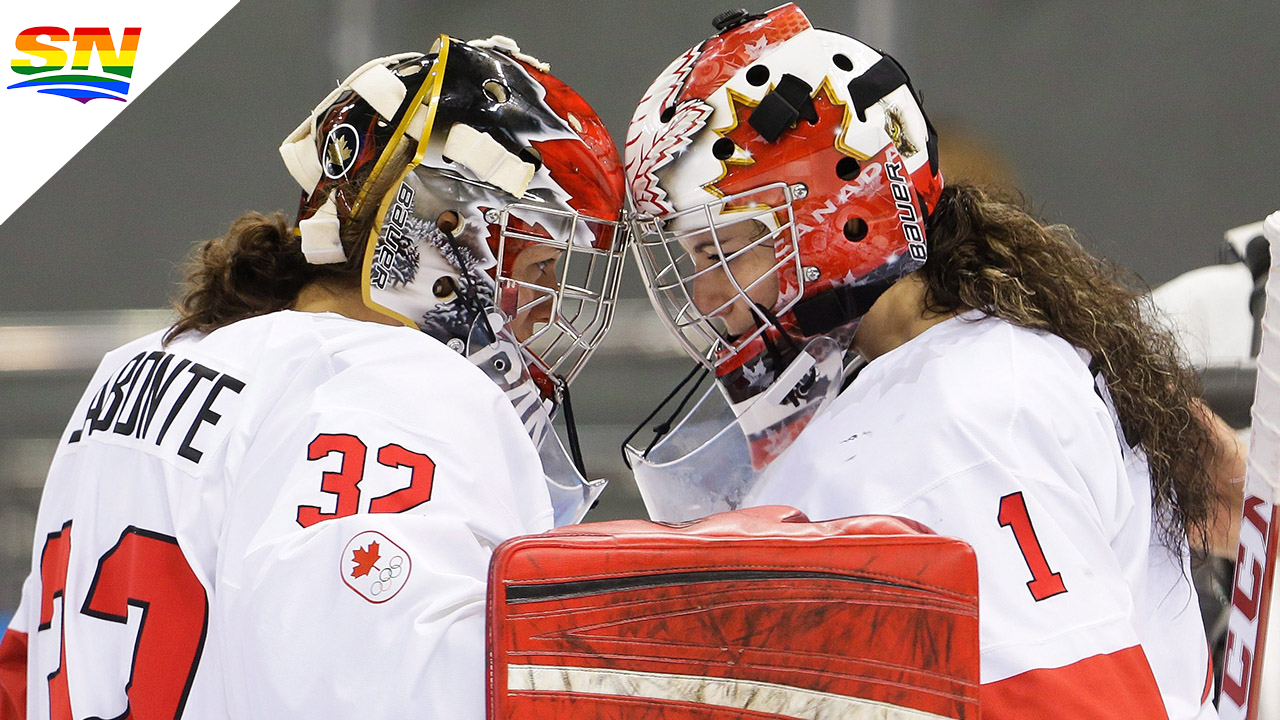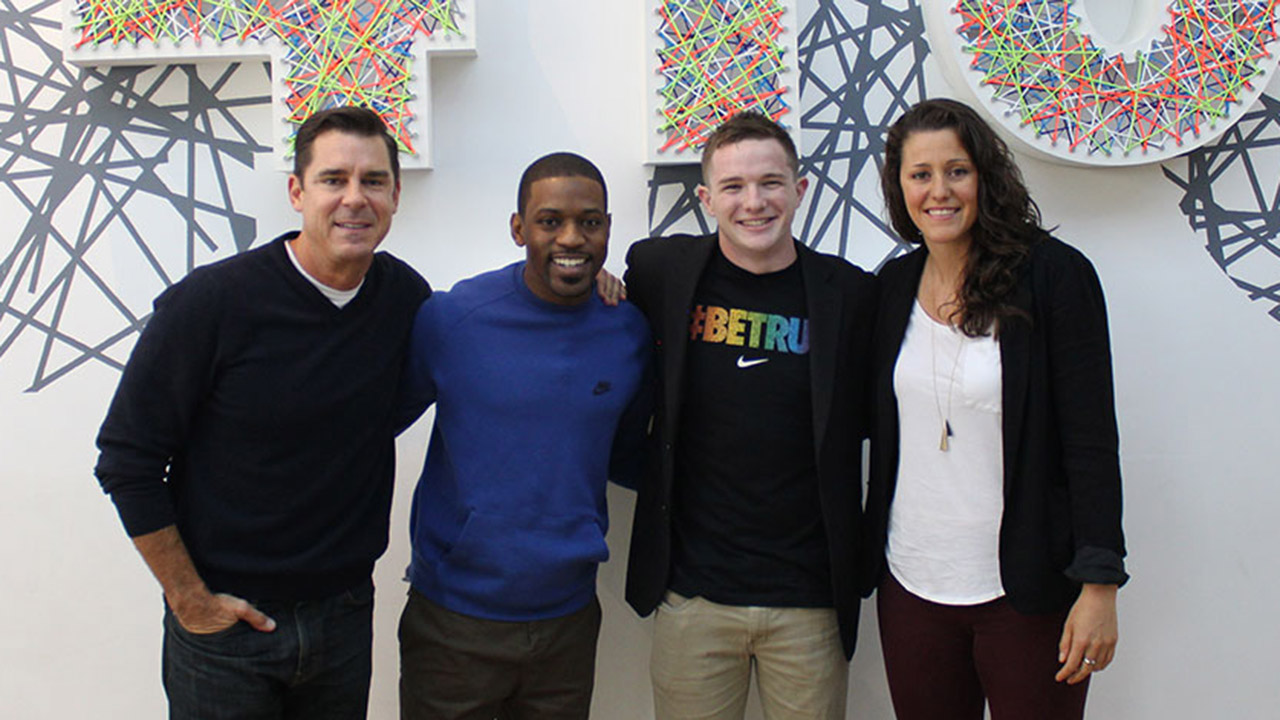
A few years back, I sat down for a roundtable conversation with three out athletes of different sports, backgrounds, ages and upbringings to see if there were any commonalities in their journey. The only thing they had in common, beside their sexuality, is they were featured in the documentary Out to Win, which was then the talk of the Toronto Film Festival and was produced by Canadian filmmaker Matthew Thomas.
As I met with four-time Canadian Olympic Gold Medal–winning hockey goalie Charline Labonté, former Major League Baseball player Billy Bean — now the league’s ambassador for inclusion — and Conner Mertens, the first openly bisexual NCAA football player, they candidly shared their unique perspectives on everything from their own roles in the movement to why it remains so difficult for high-level athletes to come out.
With June being Pride Month, it seemed a perfect time to bring this back up.
Sportsnet: Why did you feel compelled to not only be an out athlete but be a part of the documentary Out to Win?
Billy Bean: I feel a huge responsibility to the athletes that are coming after me. I’ve come to see the great examples of, say, Billy Jean King and Martina Navratilova, [but]there were not many male role models for someone like me.
Charline Labonté: When I decided to come out, it was not about me. It was about opening this window on gay athletes, on female athletes. As opposed to what [Bean] said, right now I think there is a lack of women role models so that’s why I was like, “Why not? I’m out. I’m very comfortable with who I am. And if I can help one, two, three people, this is going to be worth it.”
Bean: I think people having the opportunity to see an athlete in the prime of their career, whatever their truth is, it encourages you to be authentic. So it’s not so much as you need a representation of a lesbian female athlete or a heterosexual athlete, but just people feeling safe to be themselves. It’s an exciting time. And that doesn’t happen until people are actually in it, which, again, is different from my generation. You see this kind of exposure is going to help so many future athletes. You just start to pass the baton forward, and pretty soon it won’t matter.
SN: Not many people understand how difficult that decision is to come out for anyone, but can you put in perspective as an athlete how difficult that decision is?
Conner Mertens: We live in a society where athletes are elevated to this ultimate God-like status. Nobody has a bigger platform. And when you have these athletes that have so much power, they have power to create change. And with that power comes this idea that we’re supposed to be perfect. We’re supposed to follow that line of what it means to be a male or female athlete. And the problem is if you don’t follow that narrative you’re scrutinized or ostracized and seen as weak.
Of course in athletics the most important thing is to be competitive. You don’t want your teammates thinking you’re weak; you don’t want your opponent thinking you’re weak. So you internalize all these things that society calls a weakness and hide them so you can protect yourself, so you can protect your team, so you can excel at something that is influential in our society.
SN: There is a certain expectation that as a gay or lesbian athlete you’ll be up front about talking about it, but at the same time you want to be seen as the same. If you’re, say, an African-American athlete there isn’t an expectation that you’ll speak on all African-American issues. At times can being seen as someone who needs to further a cause be a burden for an athlete?
Bean: Well, I think the example you just mentioned, the African-American athletes, were expected to [speak on African American issues]if they were great 30 years ago. And you saw a lot of baseball players – Hank Aaron, Willie Mays — because they were so good at something and it was so important to so many fans. It is a huge responsibility and part of my job now with Major League Baseball. It’s one of my biggest concerns because I don’t want one player to have to harness the whole movement on their shoulders while they are trying to play.
As a former athlete you know just how hard it is to get yourself to stay healthy, to stay focused, keep your body in shape and have the opportunity especially in team sport. So creating a culture of acceptance and having images that are consistent and strong and that the entire sports world sees that reduce that stigma…. That’s when you’re going to see our younger athletes less concerned about their private lives and being part of the equation.
SN: In the film, former NBA player Jason Collins talks about the fact he didn’t get a phone call from the President, but shortly thereafter [NFL draftee and CFL player] Michael Sam did. Have you been surprised about how fast people are trying to be on the right side of history when it comes to this discussion?
Bean: I’m not surprised. I’m happy about it.
Mertens: It’s really beautiful. When you think about the history of social change, sports have always been in the mix of it. You see Nelson Mandela with apartheid and Jackie Robinson and all these athletes and sports have been sort of the catalyst for social change, and I think this is just another example of that. We are going to look back and see these people. These Billy Beans and Michael Sams who were blazing the trail. We’re going to read history books of these people. My kid is going to read about the civil rights movement and the LGBTQ movement, and we are going to see these names and it’s going to be a beautiful thing.

SN: You guys are different ages, and from different sports and backgrounds. Do you learn from each other’s experiences?
Bean: Absolutely. Just sitting here together, sharing experiences helping each other not perpetuate the same mistakes. The beauty of the way these kids are able to network today is now they all know each other before they meet together. I never met anyone who was like me until four or five years after I played. It’s like anything to be a part of that arc, that movement forward. It helps you have closure for things that didn’t go the right way at least for me in my career.
SN: We know of more gay athletes in female sports than their male counterparts. Charline, is your journey different because you’re a female athlete?
Labonté: Yeah, I think so. First of all I play a team sport. In women’s hockey it’s an open environment, and it’s always been like that. Plus, I was somewhat straight before I thought I was gay. It didn’t change anything, people didn’t change towards me. It’s more like, “Oh, all right. Let’s move on.” So people really talk about it and everything else openly, so it’s really never been an issue.
That’s why, for me, I never had the need to come out because people knew — my family, my friends, my team — which is the most important part. But … when I heard different stories of these guys and non-athletes and I realized there is still so much work to do, I just wanted to help a little bit. But for me it’s been an easy process.
SN: Conner, when you came out it was very publicly and you were able to see the feedback almost immediately via social media. What was that experience like for you?
Mertens: First it was very scary. I had no idea how people would react. I knew I was comfortable no matter what, but I was hoping it would be some sort of positive impact.
Bean: That’s where it’s different now for these kids. You know people can be much more aggressive with you when they are not in your company.
Mertens: [nods in agreement]
Bean: It seems like the media is better with it, the players are much more evolved, and while not everyone is comfortable with it I’d say the majority are [as long as]you are a good enough player and a good enough teammate. But (with) the nature of the internet and Twitter and Facebook … you can put yourself out there to be attacked, and some people just aren’t used to that. It doesn’t matter how famous or how successful you are — it’s not fun to have negative things said about you. So there is a very interesting balance between the harmony you have amongst your team.
We may not have 25 out athletes all feeling comfortable to come forward. We know we are getting to that place. Some are interested in wanting to know what it was like for Conner to come out, but others are so afraid and want to make it to the NBA or the NFL and feel that might be the deciding factor on why a team passes up and takes the next guy or the next girl. So it’s an individual process and we can’t just put a blanket statement towards what it means to come out.
Mertens: I was definitely like that. I would distance myself from anything LGBTQ related until I was about 18. There was a gay/straight alliance at my school and I was the one that was avoiding that hall. I was so terrified that I would be guilty by association in any way. And I just denied it so long.
Even the advocacy work I do now: I’ll see a kid that favourites a tweet every once in a while or retweets something, but it takes him four months until he says anything to me and then he’s like, “I was trying to say something for so long. I just didn’t want anyone to figure me out.” And it’s heartbreaking that we are at that crossroads where these people are finally getting the courage to reach out, but they are afraid of the backlash they might receive for reaching out.
Bean: I feel it’s still a win that these kids see they have an opportunity if they are ready for it. Sometimes perfect gets in the way of good. I was doing work with anti-bullying organizations before I got back with Major League Baseball. The less stories we hear of kids who feel they couldn’t get past that dark moment — we have to remind ourselves and keep sharing the stories that we are making good progress. And give them the time. If they need six months from the first retweet — you let the conversation happen on its own, and I think that’s why mentorship is a huge generous gift back to the community if you are willing to do it. Because it’s not easy.
You get invested, at least for me. I’ve had this going for 15 years almost now and you get so invested in the well-being of these kids especially if they are athletes you can relate to that. Athletes need a village for them to succeed. It’s just the truth you need solid home environment, you need to stay healthy, you need coaches, you need opportunity and you want to give them opportunity to be their best.
A version of this story was first published in 2015.




